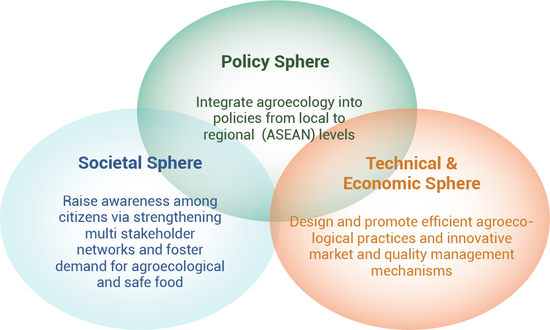Approach & Methodology
The building of shared theories of change and the spheres of influence of the project
The project acts within the three overlapping spheres of influence, namely the societal sphere (consumers and citizen demands for safe agro-ecological products), the policy sphere (enabling environment at national and regional levels), and the technical and economic spheres (agroecological and safe food system innovations from the local to the regional levels), as described in the figure below.
Multi-stakeholder groups are organized to collectively define theories of change (ToC) of the agroecological and safe food system transitions from the local (flagship sites) to the national, and regional levels. As part of it, project contribution to these ToC will be specified. Different impact pathways will hence be specified with respective contributions of the actors to these routes pertaining to the three spheres of influence.
To formulate with large multi-stakeholder groups a shared vision and plausible nested impact pathways of the transitions, at flagship, national and regional levels, the project will adapt ImpresS (IMPact of RESearch in the South) ex ante methods in combination with other ToC approaches (see below in the box).
A multi-tiered approach combining networking, knowledge co-generation and sharing, capacity development and policy dialogue
Building on the shared vision of the transitions, the project will endeavor to strengthen and broaden the ALiSEA network, partnerships and knowledge sharing capacity as well as to raise awareness and build capacity of a large audience.
It will also support technical, organizational and institutional innovations at territorial level in flagship programs through integrative action research processes; and consolidate pathways to bring these innovations to scale, through better linking agricultural and market changes and help mainstreaming their enabling conditions into policy frameworks at national and regional levels. It will co-generate and share knowledge, including robust evidences on performances and impacts of agroecological innovations, towards upscaling; and inform and strengthen policy dialogues from local to national and ASEAN levels (notably supporting evidence-based policy changes).
As part of the knowledge sharing tools, the current ALiSEA multimedia platform (https://ali-sea.org) will be transformed into a broader knowledge hub with a view to better integrate different sources of knowledge and strengthen the possibilities of different stakeholders (including farmer communities, policy makers and the research and development communities) to take advantage of broad and robust knowledge basis.
The project also builds on the long experiences of partnerships in research for development of the research platforms in partnership: dP Malica and dP ASEA; and will rely on and support the Lao facilitated Initiative on Agroecologie for Asean (LICA).
| The ImpresS ex ante approach elaborated by CIRAD is a participatory, iterative and adaptive process to formulate the desired and most convincing potential impact pathway of a future project. It makes explicit the underlying logic of how things will happen and with whom, and the most plausible hypotheses on which the project intervention is going to act. It also aims at building interventions that allow to learn during their implementation and take informed steering actions when necessary. . The approach consists in a 6-step iterative process to incorporate the viewpoints of the different actors involved in a given innovation process: 1) Building a first hypothetical impact pathway, based on initial diagnosis and need assessment; 2) Mapping outcomes; 3) Taking into account public policies; 4) Strengthening capacities among stakeholders; 5) Finalizing the main impact pathway and designing alternative scenarios; 6) Design a participatory monitoring, evaluation and learning (MEL) system focused on outcomes to enable strategic management and understanding of outcome generating processes. Innovation story, outcome mapping and impact pathway are the three main used tools |
for more details, see https://impress-impact-recherche.cirad.fr/ex-ante/

